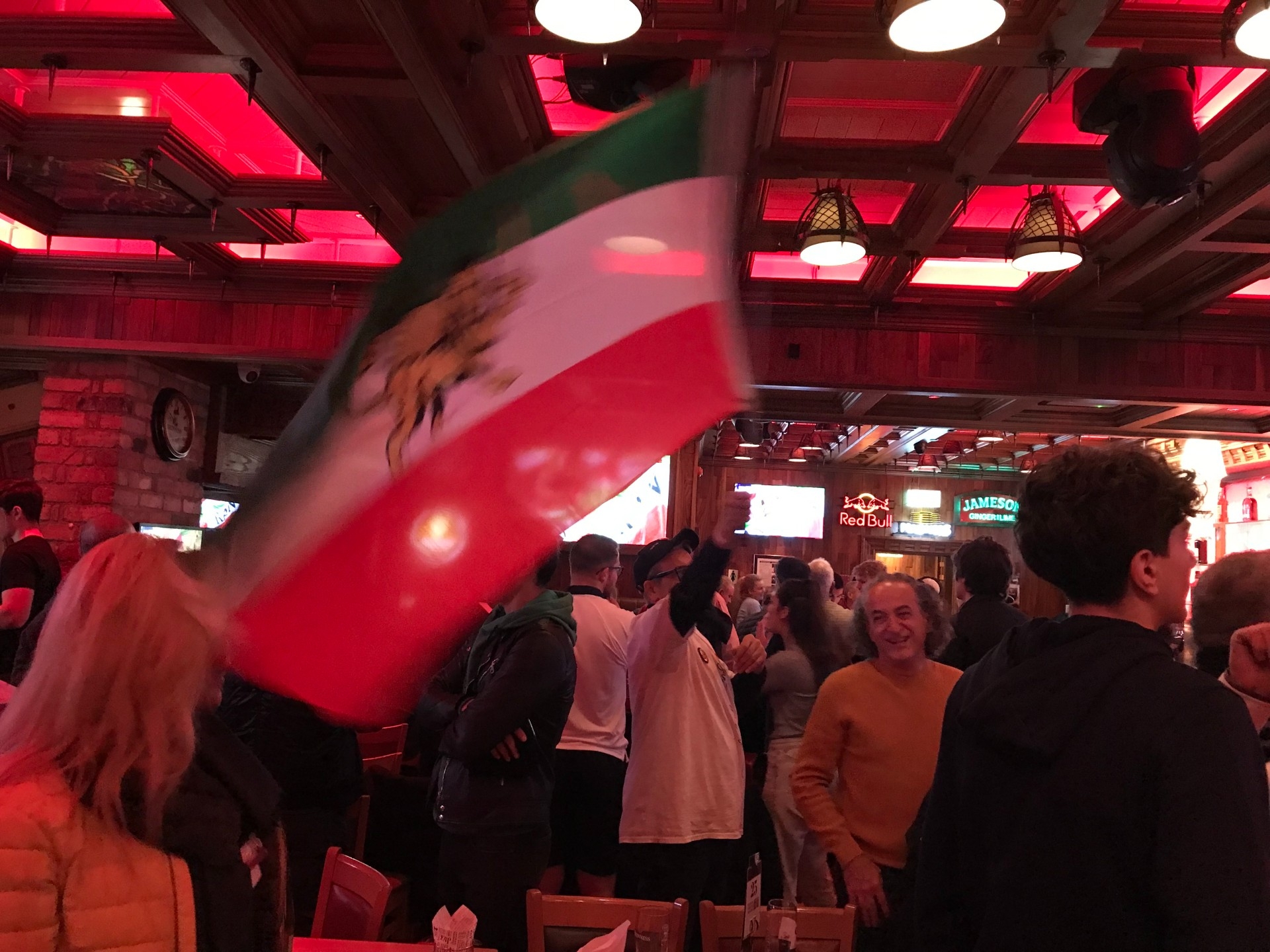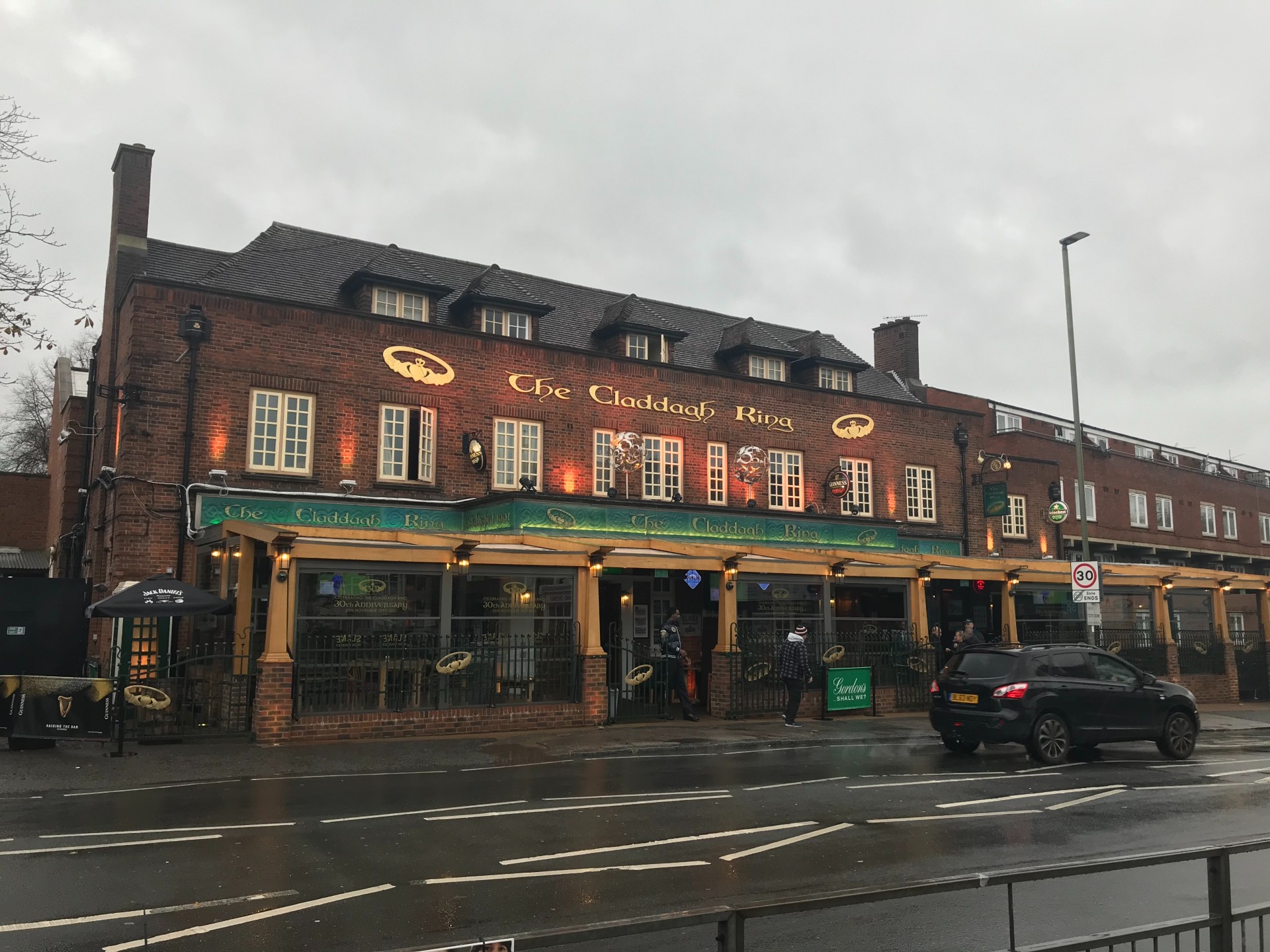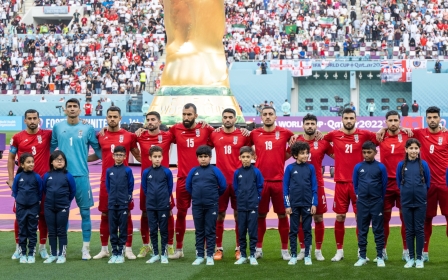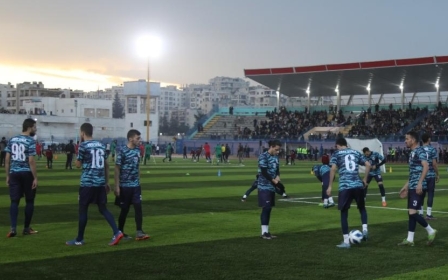London's Iranian diaspora crams into Irish pub for match of mixed emotions

At an Irish pub on the northern edges of London, over 100 Iranians gathered to watch the World Cup game between England and Iran.
It was a far cry from sweltering Qatar. Outside the Claddagh Ring, rain poured down and the wind whipped down the high street. Inside, a whole section of the Hendon pub had been given over to the local Iranian community. Behind some closed double doors, in another part of the pub, there were some England fans.
United in their support of the women-led protests rocking Iran, the Iranians present - men and women, boys and girls - were nevertheless wracked by conflicting emotions.
Over the weekend, a debate about whether to boycott the game had been raging. People are being killed on the streets of Iran, thrown in prison and threatened with execution. One rights group estimates that 410 protesters had been killed in the unrest as of Saturday, including 58 minors.
New MEE newsletter: Jerusalem Dispatch
Sign up to get the latest insights and analysis on Israel-Palestine, alongside Turkey Unpacked and other MEE newsletters
In the run up to the tournament, Iran’s players met with President Ebrahim Raisi, a couple of them even bowing in his presence.
At the pub in northwest London before the game, many fans thought the players had gone too far in legitimising the Tehran government, and not showed sufficient support for the protests, which broke out two months ago when Mahsa Amini, a 22-year-old Kurdish woman, died in police custody after being arrested for allegedly wearing her hijab “inappropriately”.
Demonstrators have since called for an end to the draconian laws on women’s dress and an end to the so-called “morality police”. Some - particularly in the diaspora - have called for an end to the Islamic Republic altogether.
“Deep down we are supporting Iran,” Sahar, who grew up in Iran and has lived in Britain for 12 years, told Middle East Eye. “And deep down we know the players probably support the people. But it is a confusing situation.”
“We are just torn apart,” she added. “We all have mixed feelings. Four years ago, there would have been much more emotion in this room.”
No singing is winning
Nevertheless, the room was full, the Ey Iran patriotic song was being sung and the pre-Islamic Revolution lion and sun flag could be seen flying.
Then Iran’s players refused to sing the national anthem and the London pub erupted: here was a sign that the players shared some of the fans’ feelings about the Mahsa Amini protests and the authorities’ policies.
“Now they haven’t sung the national anthem, it makes it easier to get behind them,” said Nazlee, a British Iranian. “It’s not a position I would want to be in. It’s one of the most watched events in the world and they are under enormous pressure,” said her friend Neda.
Both women said they wanted neither England nor Iran to win. They were there to witness a historic event. “My family in Iran wants England to win,” said Nazlee. “They are calling the Iranian team the Islamic Republic team. We have the luxury of being a bit more distanced.”
Everyone present said their relatives in Iran supported the protests but that many of them were too afraid to go out onto the streets. Others told MEE that friends or family members had been attacked by security forces.
'Now they haven’t sung the national anthem, it makes it easier to get behind them'
- Nazlee, British Iranian
Despite the mixed emotions, England’s goals were met with disappointment and any sign of an Iranian attack was roared on.
When Mehdi Taremi clawed back an Iranian goal to make it 4-1, the pub went wild and it was clear that football’s traditional place as a unifying force in Iranian life was not completely defunct. This wasn’t a crowd anyone could accuse of getting behind Gareth Southgate’s men.
Even Gerry, one of the few England fans in the Iranian part of the pub, said he had been supporting Iran - this despite the fact that he was wearing a full England kit. With an Iranian wife, Gerry said he wanted both countries to go through to the next round of the World Cup, but that he didn’t like England manager Gareth Southgate and wanted to see him shown up.
At the bar, underneath a suspended T-shirt with a protest slogan splashed across it, Pedram, a 43-year old interior designer who grew up in Iran and has been in England for three years, said that his relative privilege had enabled him to live a happy life in the Islamic Republic.
That didn’t stop him from opposing the government and supporting the protests. “If you care about other people you fight for them,” he said. “Iran is so rich and its people are so poor.”
Born at the time of the 1979 revolution, Pedram said he had been with Iranians who were discussing the historical parallels the night before the game. “The older generation, they say that something is going to happen now. They say that these protests remind them of that time,” he told MEE.
An emotional ending
Towards the end of the game, with the result no longer in doubt, fans were reflective, speaking about the exhaustion of the players and the sense that more important things are happening in Iran right now than football.
“We’re not happy about the result, but … this is more important than winning a game,” Sahar said. “Forty-three years of compressed feeling has exploded. Enough is enough. We can take it no more.”
Her husband, Mehdi, was in a reflective mood. “I feel kind of sad,” he said. “They didn’t sing the national anthem, but that wasn’t enough. They didn’t play football. I don’t know if that’s because they weren’t mentally prepared.”
Sinai Noor, a 33-year old filmmaker who on Saturday was speaking outside Downing Street as part of a thousands-strong protest, said plenty of Iranians had boycotted the game.
“I did not come here to support them, but I’m a patriot so I don’t want them to lose… Football doesn’t matter to me at this point, where more than 400 people have been killed in Iran,” said Noor, who was born into a left-wing family and whose uncle was killed in a wave of executions in the 1980s.
Still, what Noor and many others present could see was the effect the political situation was having on the team.
A team who at its last tournament had gone toe-to-toe with Portugal and Spain was being swept away by England. With goal after goal going in, Iran’s players looked lost and confused. The world had overcome them. England had scored six to Iran’s two.
“It’s still sad. I’m sad for the players. They are shattered. I can tell. Everyone is saying we don’t give a shit but we do,” Noor said.
This was particularly true, he said, when it came to playing England. Not only is England home to everyone in the pub, the British government was also behind the 1953 coup in Iran, which was mentioned by more than one fan as a major event leading to the situation today.
“There’s bigger things going on but if your country loses, you’re going to feel bad,” said Ryan, a 16-year old who was following the protests in Iran closely.
With the game finished and fans winding their way out of the pub, Nazlee shows MEE a message from her family back in Iran, who were celebrating the England victory. “They were hoping for six,” she said.
Middle East Eye delivers independent and unrivalled coverage and analysis of the Middle East, North Africa and beyond. To learn more about republishing this content and the associated fees, please fill out this form. More about MEE can be found here.





